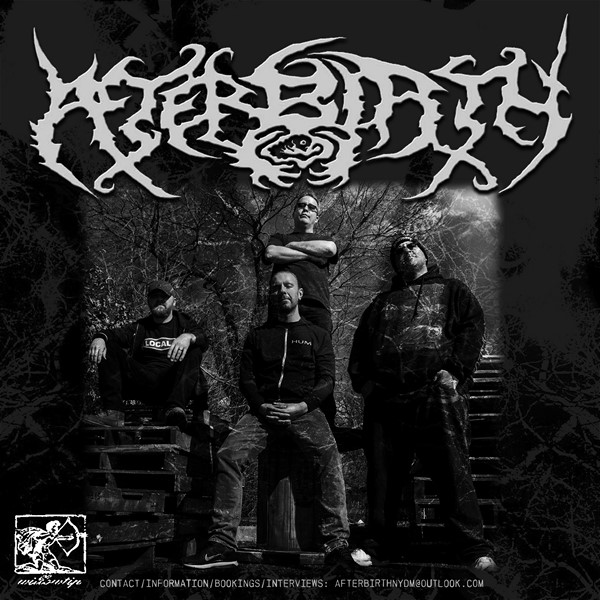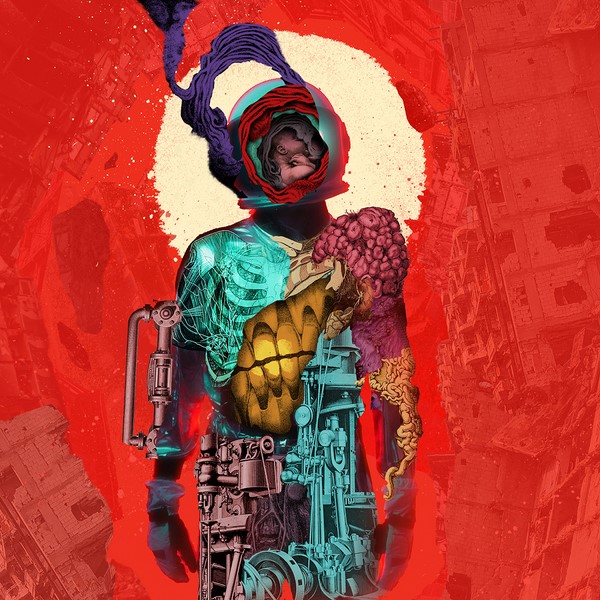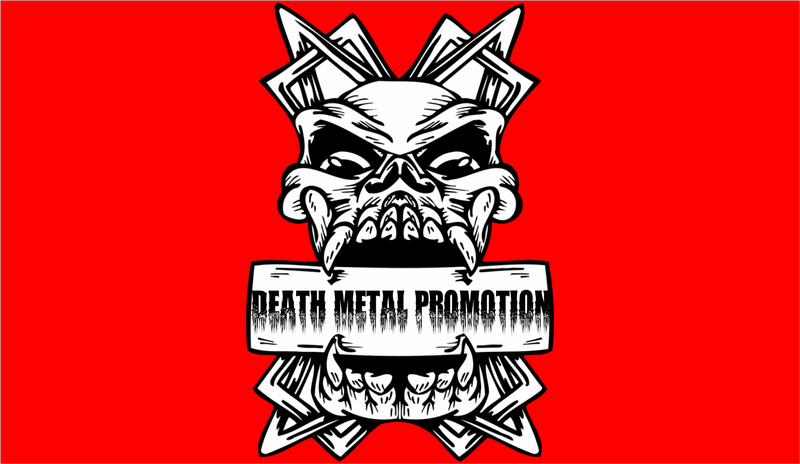 Hi! How has partnering with Willowtip Records influenced your creative process for “In But Not Of”?
Hi! How has partnering with Willowtip Records influenced your creative process for “In But Not Of”?
Hello, partnering with Willowtip has been a fantastic dream come true for me and the band members. I’m not sure how much being on the label influenced us as much as it allowed us to feel a greater sense of fearlessness and freedom while writing the new material. Knowing it would be on a label known for its experimentation and alternative approaches to extreme metal, we felt less inhibited with what we were coming up with in the rehearsal space and felt more confident that the label would enjoy and appreciate what we would eventually hand in to them.
Can you discuss some of the interconnected themes and narratives explored in the album?
Honestly, that would be a question the vocalist could answer a bit better than I can, but I’ll give it a shot! Will has a wild and vivid imagination and though I often come up with the song/album titles and give him a little bit of information on what I think the songs are about, he takes that and runs far, far away into all kinds of places I’d never even dreamed of. I’d say that while Will might at times write and sing about typical subjects you find in death metal (gore, pain, death, etc.), he also takes into more introspective and philosophical areas that have, at least to me, a greater depth of human emotion and feeling.
How do you see the evolution of brutal death metal since your inception, and where does “In But Not Of” fit into this evolution?
Hmmm, not sure exactly, but it’s kind of interesting how it is evolving, while simultaneously remaining some of the heaviest, devastating and ignorant forms of music on the planet. Like, it’s generally accepted that most brutal death metal bands will remain un-evolved, and it’s the way both fans and bands like it. But then you have certain bands, maybe us, Defeated Sanity, Wormed, who have moved slightly askew of that template, and the fans have been very accepting of it. There’s an open-mindedness to some extent that exists within the genre as to bands moving beyond their earlier incarnations.
As far as our new album is concerned, I think it fits into the evolution perfectly. You have the standard and typical stylings of brutal death metal on offer within the record, but then there’s also many instances of a progression away from those things. The thing is, is that everything we do, whether it’s standard brutal death metal or not, is that it’s heavily rooted in our early explorations, always coming from a brutal death metal origin. I believe that comes across in the music to the people listening to it and it makes sense in a weird way. You might hear a more progressive/alternative section of the brutal sound, but it’s surrounded by brutality and seems to fit nicely together. That comes across as sensible to the listener, so it isn’t shocking and the way we’ve moved beyond what might have once been expected of us seems to make sense to everyone, evolutionarily speaking.
How do you blend jazz-inflected riffing and avant-garde experimentation with brutal death metal in your songwriting?
I don’t know if there’s a tried-and-true methodology to our sound and how we do what we do. I present the songs to the band, and we flesh them out over months/years, with everyone contributing in their own special way. It all ends up coming together in ways that don’t seem too jarring or shocking. Like, it somehow all flows, and fits smoothly together, each little piece. It’s sort of a mystery to us I guess, and we don’t question it too much. It’s a process that happens organically through knowing each other for over 30-years. Perhaps it’s the personal connection that allows us to write and play the way that we do.
What’s the significance of the album’s title, “In But Not Of,” and how does it reflect the record’s themes and vision?
The album title can be seen as a statement directly from the band. We are simultaneously in the genre of brutal death metal, but at this point we are no longer of the genre either. We’ve happily expanded our sound beyond the usual confines in a way that isn’t a criticism of the genre itself or of our personal past involvement with it. We’re not denouncing anything. Rather, we’re happily proclaiming that we are both part of it and not part of it at this point in our musical careers.
The title can also be read as something of a spiritual statement in that we all are “in” this world (incarnated in a physical form) but “not of” this world (we are flesh machines animated by spirit/energy that has purposes and design greater than we can see and imagine).
What prompted Afterbirth’s reunion in 2013, and how did it influence the band’s dynamics and creative process?
It’s simple: the band was asked to reissue both our demos and some live songs on CD. Once I got in touch with the guys in the band to see if they were cool with me doing this, we just decided to jam again and see what happens. There was not a great plan to reform at once, rather, it was a few sparse practices that happened over the course of a year or so. We realized that we were not only having fun, but it seemed to us that there was a special connection and magic to our music that we should try and explore further. Of course, we had no idea that we’d come to this point with our music and lives, it’s very special.
How did the departure of Matt Duncan impact Afterbirth’s direction and sound?
The departure and loss of Matt was a heavy blow to both the band as a whole and each of us personally. It’s unfortunate that we clashed with our ideas and that also, though there was a deep connection and friendship that still existed amongst us, we were slowly moving apart musically and as people. It reached a point where it could not be ignored, and we asked him to leave. I hated that time of the reformation.
It seemed as if we were on the cusp of so much and then had to deal with that situation as well. The band, after we removed Matt from the vocal position, almost folded again, but we continued as a three-piece unit, even playing a few shows with just a drummer and guitarist. We continued to write new material and even recorded our debut album without a vocalist!
There was a lot of discussion about what the band was about, who we were and where we wanted to take it. There was a lot of uncertainty, but the creative spirit was still there without him. However, it affected our direction and sound, I know that it did affect us and was a difficult time for us all, like, why did we even get back together, only to break up again so soon? It seemed that we were sort of doomed to become that band once again. But we were determined to not let things go so easily this time around.
Though it was hard to see and imagine at the time, I think through losing him, but continuing to persevere despite the odds after losing Matt, we were affected in a strangely positive way that forced us to continue and explore what the possibilities were and what opportunities were waiting for us.
Can you share insights into the recording process of “In But Not Of”?
There’s not much mystery here. We booked time in a studio we liked (Menegroth) with someone we were comfortable with (Colin Marston) and recorded everything there with him guiding us through the process. It was a rather quick session, with us only actually having time to record the songs over the course of a weekend, with us going back over a couple of more weekends to do overdubs, have additional musicians add their unique flavor to things and the final mix/master sessions. I’d say that it’s probably quite typical of how most bands go about capturing a new album.
How has your approach to songwriting evolved since your 2014 Demo?
When you’re 19-years-old, you have only heard so much music, and experienced the world in a limited way. That is bound to reflect on what you are capable of and what you’d like to say back to the world. Afterwards, many years later, when you then have close to two decades of additional life experience behind you (as in the time of our reformation), there’s more to take from and build upon. I had by that point heard and been influenced by so much more music and had expanded my world view considerably, so, songwriting was a different, more complex process, even if it was an uneven one. If you’re willing to grow and be open to things (as a musician and as a person), you’re bound to evolve into something you could not have been when you were younger. That has been the case with me, as I am sure it is the case with the other band members.
How do you reconcile individual creative visions within the collective process of creating an Afterbirth album?
Not sure if I mentioned it earlier on, but I do most of the main songwriting and present it to the band with some crude ideas as to what I’d like to hear in terms of bass and drums. From there, we work on songs section by section, fleshing it out more fully from my simplistic guitar sketches. Both Dave (bass) and Keith (drums) will take what I am offering and run with it. They’ll start with some basic guidelines as to my initial vision and thoughts about what should be happening in the song, but once the music becomes more familiar between the three of us, they’ll usually start experimenting with different ideas within the song’s guitar structure. I sometimes offer my own ideas, thoughts and criticisms about what they’re doing, but whatever they do is usually fine with me. They’re both such talented musicians and I never doubt their intuition about what they feel is best for the song.
As far as vocals and lyrics are concerned, Will handles that on his own. And though I am generally the person in the band who comes up with the song/album titles and will on occasion show him some lyrics I’ve written, he does what he does naturally without my interference. He has his own unique vision of things and has a wonderfully descriptive lyrics writing style that no one in the band could improve upon, so it’s not something I like to get too involved in. Why mess with the band member’s genius since it all contributes so fluidly to the whole?
How do you view experimentation within death metal, and how does Afterbirth contribute to pushing these boundaries forward?
Death metal of any kind is ideal for experimentation. It’s always been so I believe. Paradoxically, it seems that death metal is a very rigidly defined form of music, and we anticipate it behaving in a certain way, but at the same time, it’s always been a space where musicians can expand upon that basic template in ways that haven’t been done before. Even from the very early days of my association with it, some bands have chosen to do whatever they feel is creatively the best next step for them, and that was sometimes some very weird, different stuff.
Like, I can remember in the very early 90s when some bands were experimenting with styles such as “death n’ roll”, which, though an experimental form of death metal I don’t care for, was still an experiment that many people enjoyed. And, at the same time, no one ever said “Hey, that’s not what death metal is supposed to sound like!” No, it was generally acceptable as death metal, and became its own niche genre that still enjoys popularity today.
So really, musicians within the death metal genre can (and should) do whatever they feel is “correct” for their style. What’s the harm? You’ll always find bands that attempt to push the envelope that you enjoy, and sometimes you’ll come across a band that is doing things that don’t particularly work for you. And that’s fine. Move onto the stuff that you feel the most alignment with and leave the others to be enjoyed by those that can.
Afterbirth is just doing what all those other bands did that came before us. We’re just playing the music that we’ve loved and doing what comes naturally. It just so happens that what we’re doing is slightly off-kilter from what’s come before. I can’t say what we’re doing is 100% the most original and unique thing ever, but we are taking chances and blending styles of all forms of music that we find enjoyable and pleasing. I suppose you could say that we’re pushing these boundaries forward, but it’s not like we sat down, had a discussion and said we were going to do this. It just stems from a love of music and an attempt to blend different styles and genres together into a cohesive whole.
What’s next for you? Thank you for your time!
For now, we’re just focusing on writing new material – we have so many ideas already at work! – and playing shows when the opportunity arises. There’s not much more to it than that now. Thank you so much for the interview, we hope people enjoy reading it.
instagram.com/afterbirthnydm
facebook.com/AfterbirthNYDeathMetal
If you really would like to support Antichrist, you can just Share our article.
You can also support Antichrist by sending a couple bucks to cover some webhosting expenses. =>> PayPal



